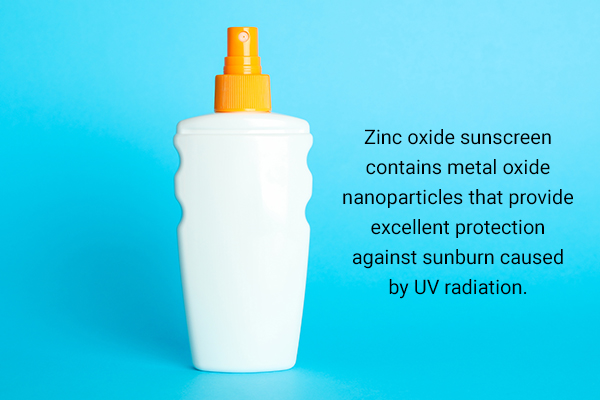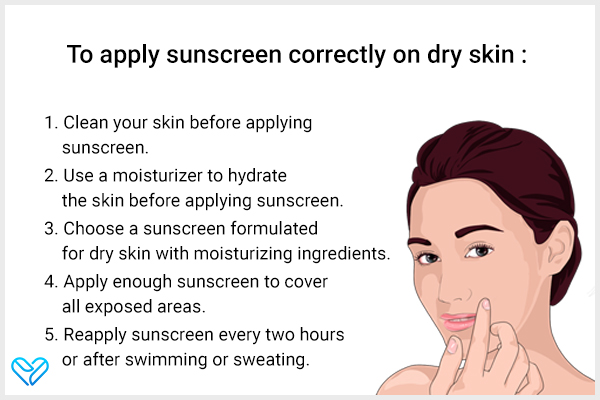In this article:
Zinc oxide is a common ingredient found in many sunscreens that helps protect the skin from harmful rays of the sun.

While zinc oxide is generally safe to use, some experts, such as dermatologists, share that it might cause dryness for certain individuals. This means that if you have dry skin already, using sunscreen with zinc oxide could potentially make it even drier. (1)
However, it’s important to remember that not everyone will experience dryness from zinc oxide sunscreen. Its effects can vary from person to person.
Research Evidence for Zinc Oxide Sunscreen Causing Dryness
Using sunscreen with a high concentration of zinc oxide may potentially cause dryness, as indicated by some research.
This is because zinc oxide has been associated with characteristics commonly seen in dry skin conditions such as psoriasis and atopic dermatitis, including increased thickness of the outer layer of the skin, a scaly appearance, and abnormal skin shedding (parakeratosis). (2)
Research also showed that the use of zinc oxide dressing on healthy skin can lead to increased dryness compared to other types of dressings. This further indicates that the presence of zinc oxide in sunscreen might potentially cause dryness. (2)
If you do experience dryness from sunscreen, don’t skip it, but find a more compatible one instead. To minimize the chances of dryness, it’s advisable to choose sunscreens that are alcohol-free or specifically labeled for sensitive skin.
Are Zinc Oxide Sunscreens Safe for Other Skin Types?

Zinc oxide sunscreen is generally safe for all skin types, including oily skin. It contains metal oxide nanoparticles that provide excellent protection against sunburn caused by UV radiation. These nanoparticles are designed to stay on the surface of the skin and do not penetrate deeply into the body.
Zinc oxide sunscreen is effective in blocking both UVA and UVB rays, which can cause skin damage and sunburn. It forms a protective barrier on the skin that reflects and scatters the harmful UV rays, preventing them from penetrating the skin and causing harm. (3)(4)
According to experts, for individuals with oily skin, zinc oxide sunscreen can be a suitable choice. It has a lightweight formula that does not clog pores or feel greasy on the skin.
How to Select the Right Sunscreen for Dry Skin?
When choosing a sunscreen for dry skin, it’s important to take steps to prevent it from causing further dryness.
For individuals with dry skin or those applying sunscreen to their face, the American Academy of Dermatology recommends the use of creams. Cream-based sunscreens are more moisturizing and can help combat dryness. (5)
Additionally, there are sunscreen products available that combine moisturizers and sunblock and are specifically designed for dry skin types. Using a moisturizer alongside sunscreen is also beneficial for hydrating the skin and preventing dryness.
Plus, if you have sensitive skin or are looking for sunscreen options for babies, there are sunscreens specifically formulated for these needs too. (5)
How to Properly Apply Sunscreen to Dry Skin?
To apply sunscreen correctly to dry skin:

- Cleanse your skin before applying sunscreen.
- Apply a moisturizer to hydrate the skin.
- Apply enough sunscreen to cover all exposed areas. Choose a sunscreen with moisturizing ingredients formulated for dry skin.
- Reapply sunscreen every 2 hours or after swimming or sweating.
Final Word
Current evidence suggests that zinc oxide sunscreen is generally safe and effective for use in protecting the skin against UV radiation, but it may cause dryness in some individuals, particularly if it is used in high concentrations or in combination with other drying ingredients.
To minimize the risk of dryness, it may be helpful to choose a sunscreen product that is formulated with moisturizing ingredients and to apply a separate moisturizer after using sunscreen.
- Was this article helpful?
- YES, THANKS!NOT REALLY


